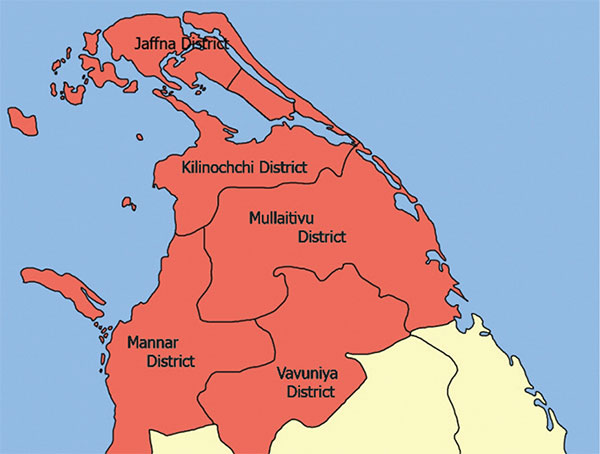Caste and Education in the North
Posted on January 3rd, 2022
By Mahendran Thiruvarangan Courtesy The Island


The last Kuppi Talk article by Erandika de Silva discussed the disjuncture between the emphasis on standardisation and the absence of serious efforts to address the challenges facing students and teachers in the peripheries due to socio-economic inequalities. She drew insights from her own teaching experiences in the North to elaborate on this disjuncture. If uneven resource allocation and development, the civil war, the North’s isolation during the war years, protracted militarization and the ethno-nationalism of the state produce the North and its academic institutions as peripheral, caste and class-based inequalities within the North create peripheries within this periphery. Today’s article focuses on how caste-based inequalities make free education an uneven terrain in the North, and sheds light on the forms of caste-based discrimination observed in educational institutions in Jaffna in the past and present.
Casteism in Education
Recently, a Panchamar caste community—a collection of five caste-based communities subjected to systemic oppression and exploitation historically and forming a significant share of Jaffna’s population today—faced severe casteist violence at Vaddukoddai in Jaffna. One person from the community lost a finger as a result; houses and properties of the Panchamar were damaged; the community was psychologically traumatized. According to the community, this violence unfolded in a context of protracted, systematic caste-based oppression in various arenas including education. The members spoke of the discrimination their children face in examinations, sports and competitions in both the private and public schools in the village; the way teachers and administrators from the dominant Vellalar caste communities ignore the needs of their children; the economic deprivation amidst which they learn; and the stereotyping of their children as drug-peddlers, alcohol-addicts and sexual perverts by the school community and larger society.
Even as some academics, commentators and the Tamil media claim that caste is a thing of the past and that educational opportunities for Panchamar communities under the free education system have levelled social inequalities, Panchamar children, teachers and educational administrators in the North experience casteism in education on a daily basis.
A Casteist Past
Historically, the dominant Vellala community has had near total to significant control over education in the North. Though one is not sure where this story begins, the Tinnai Pallikkutams or Veranda Schools where education was imparted in the seventeenth, eighteenth and nineteenth centuries were not open to Panchamar children. Mark Balmforth’s research demonstrates that in the nineteenth century, even the American Ceylon Mission, which established many educational institutions in Jaffna systematically allowed the operation of caste privileges demanded by the few Veḷḷāḷar members of its churches and schools…” In Ilankaiyil Sathiyamum Athatkethirana Porattangalum (Casteism and Anti-Caste Struggles in Sri Lanka), Vehujanan and Ravana observe that many Saivite-Tamil schools established by the revivalist movements in the latter decades of the nineteenth-century refused to educate children from the Panchamar communities. In the twentieth-century, sections of these movements felt that accommodation of Panchamar in their schools was necessary but merely as a strategy to resist missionary schools. The authors note that a few Vellalar elite supported the establishment of Saivite schools for Panchamar children in places like Thevarayali in order to segregate them from Vellalar children.
Even as Jaffna was hailed as a high seat of learning in colonial Ceylon, the Panchamar suffered discrimination in education. Those who benefitted from colonial education were disproportionately Vellalar. This social group and their descendants later formed the (English) educated middle class in Jaffna that held administrative positions in the colonial state. The educational boom of this period did not lead to significant improvement in the lives of the Panchamar.
In the post-independence period, some Panchamar Christians were able to find free admission in some of the schools established by the missionaries. However, Panchamar among Hindus were unable to afford these schools. Even within Christian schools, children and teachers from the Panchamar communities faced marginalization. Administrative positions in these schools were generally held by Vellalar with a few exceptions.
Critical inquiries into this past are important because this long history of casteism has had multi-generational consequences in delaying and crippling the progress of the Panchamar. The caste power acquired by the Vellalar over the centuries first via accumulation of land and later via education have enabled them to preserve their dominance over others even today. Such exclusions in education are a key reason for the poverty prevalent among Panchamar at present.
Free Education and Its Limits
Free education and the nationalization of schools between the 1940s and 1960s increased the educational opportunities available for the Panchamar. However, Vellalar were relentless in preventing the Panchamar from benefitting from these policies. For instance, it took nearly fifteen years after its nationalization for a school in Puttur to open its portals to Panchamar children. Casteist forces attacked nationalized schools that tried to ensure equality in seating. Even today, alumni associations and school development societies of some state schools are dominated by the Vellalar, excluding the Panchamar from engaging with these institutions and shaping their activities.
Caste hierarchies continue to interfere in appointments, transfers and promotions that take place in the education sector. A few years ago, a candidate who satisfied all the requirements for Grade I principalship was not even called for interviews because she was a Panchamar. Dominant caste actors, while blaming the state as majoritarian, use the apparatuses of the state to keep the Panchamar under their control and impede their further mobility within the education sector.
Free education and the mobilities enabled by anti-caste resistance have led to the emergence of a small middle class within the Panchamar communities. However, a large number of Panchamar still face landlessness, lack of housing, unemployment and poverty today. Many of them work in the construction industry, as agricultural labourers or domestic workers. Their children tend to drop out of school to support their parents. The pandemic and the worsening economic crisis have had a disproportionate impact on their children’s education. Panchamar families find online education expensive and inaccessible. These worrying trends result chiefly from the absence of support systems within our free education system that cater to the specific needs of Panchamar children and other marginalized groups. They underline need to re-imagine free education from a homogenous system blind to the hierarchies of caste and class into a variegated terrain with additional mechanisms to address the challenges faced by deprived communities like the Panchamar.
Caste at the University
At the University of Jaffna, issues related to caste take a back seat in academic conversations. Although the academic community at the University gives prominence to Tamil nationalist aspirations and condemns the ongoing militarization of the North, open discussions about caste are hardly encouraged, barring a few occasions. A section of the academic community is warped in its view that discussing caste in public will cause disunity among Tamils.
The academia’s silence, its attempts to reduce caste to a sociological reality within flawed frameworks of multiculturalism and its refusal to recognize caste as one of the central ways in which power operates within and outside the classroom need to be challenged. As a center of higher education in the North, the University should give, within its social focus and research culture, a prominent place to caste and its workings and questions of social justice.
Quest for Justice
Despite longstanding discrimination on various fronts including education, the Panchamar continue to demand better access to education for their children. In 2019, landless Panchamar families from a camp for the war-displaced, told a land commission that they did not want to return to where they had lived previously and requested the state to allocate them lands in areas where they lived at the time so that their children could attend good schools. At Vaddukoddai, parents from the community affected in the recent caste violence are expressing their protest against the way their children are traumatized in school. The judicial victories achieved by professionals from the Panchamar castes, like the Principal applicant who faced discrimination, give the community hope and confidence to advance their struggles for justice. Their present-day struggles find inspiration and guidance from the anti-caste struggles of the past too.
It is high time the dominant caste communities introspected into the ways in which they have (ab)used the education system to preserve and multiply their privileges, and joined Panchamar and other caste groups in their quest for justice. It is also high time the state, instead of taking advantage of the caste-based fissures among the Tamils or framing caste as an internal problem of the Tamils, acknowledged its own failure in eliminating casteism in the education sector and introduced practices that can democratize free education in ways beneficial to the Panchamar and other historically disadvantaged communities in the North and elsewhere.
Mahendran Thiruvarangan is a Senior Lecturer attached to the Department of Linguistics & English at the University of Jaffna.
Kuppi is a politics and pedagogy happening on the margins of the lecture hall that parodies, subverts, and simultaneously reaffirms social hierarchies.